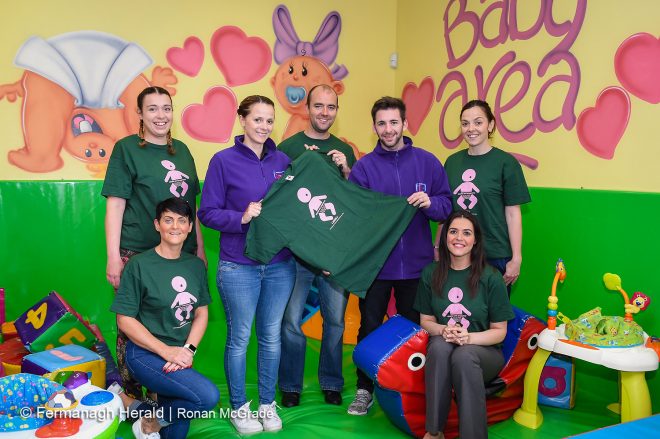
Back from left, Michelle Magee (Castle Island), Aoife Balfour (FIND), Sean Connolly (Action Mental Health), Dwayne Lyons (FIND) and Ciara Balfour (Community Family Support Promgramme). Front, Geraldine Murphy (Castle Island) and Nuala Ormsby (Solace) RMG02
FERMANAGH Drug and Alcohol Forum is supporting World Foetal Alcohol Spectrum Disorder (FASD) day, which is commemorated each year on the ninth day of the ninth month.
This date was chosen so that each year the world will remember the importance of women abstaining from alcohol during their pregnancy.
FASDs can impact children’s physical, mental, behavioural, or cognitive development. Expecting mothers are advised to not consume alcohol in order to eliminate the risk of the baby being born with FASD. If the mother does consume alcohol, the content in the mother’s blood passes to the baby through the placenta and the umbilical cord to her baby.
There is no known safe amount or type of alcohol to drink during pregnancy and there is also no safe time to drink during pregnancy, including before a woman knows she is pregnant.
Bernie Carleton chairman of the Fermanagh Drug and Alcohol Forum, advises mothers to leave the bottle behind for nine months for the good of their baby.
“To prevent FASD, a woman should not drink alcohol if she is planning to have a baby or while she is pregnant. Many women often don’t know they are pregnant for up to four to six weeks after conception. In the UK, nearly half of all pregnancies are unplanned. Brain growth takes place throughout pregnancy so the sooner a woman stops drinking, the safer it will be for her and her unborn baby.”
The incidence of FASD in Northern Ireland as well as internationally, is not accurately known but it is estimated one in every 100 births are effected which amounts to approximately 250 babies a year being born with Foetal Alcohol Spectrum Disorder. However many children are not diagnosed therefore making it difficult to calculate the true figure of those who may have FASD. Drinking while pregnant may pose and increase other risks to both the mother and the unborn child such as miscarriage, premature labour and still birth.
“There may be conflicting information on recommended intake of alcohol during pregnancy and the impact of drinking might have on the unborn child but there is one certainty that Foetal Alcohol Spectrum Disorder is 100 percent preventable providing no alcohol is consumed by the mother during her pregnancy,” concluded Bernie.
If you have any concerns about pregnancy and alcohol intake, do not hesitate to contact your GP or midwife.








